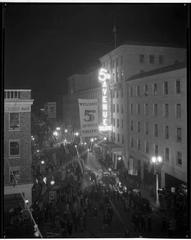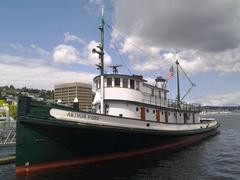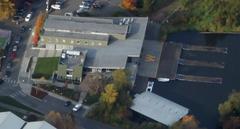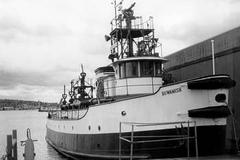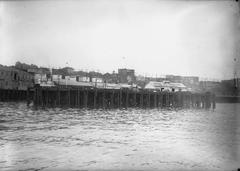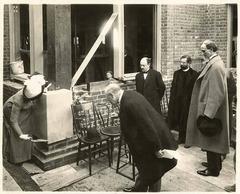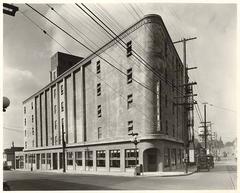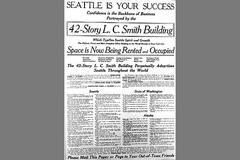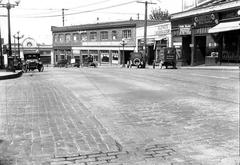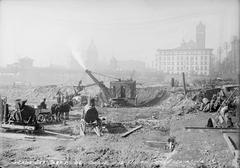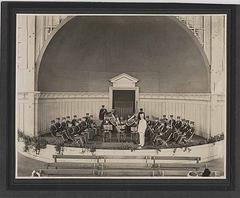
OK Hotel Seattle Visiting Hours, Tickets, and Attractions Guide
Date: 04/07/2025
Introduction: OK Hotel Seattle – History and Significance
Situated in the heart of Seattle’s historic Pioneer Square, the OK Hotel is an emblematic landmark representing the city’s musical legacy, architectural heritage, and evolving urban culture. Constructed in 1917 by Harry Buttnick as a workingmen’s hotel, the building’s journey mirrors Seattle’s own transformation—from serving waterfront laborers to becoming a linchpin of the 1990s grunge and alternative music scene. Most notably, the OK Hotel hosted the first-ever live performance of Nirvana’s “Smells Like Teen Spirit,” a moment that cemented its place in rock history. Though it ceased operation as a music venue following damage from the 2001 Nisqually earthquake, the OK Hotel building has since been adaptively reused as artist studios, apartments, and community retail spaces. Today, it stands as a touchstone for Seattle’s creative past and present, drawing visitors eager to engage with the city’s vibrant cultural story (Cascade PBS, Wikiwand, HistoryLink Tours).
Table of Contents
- Introduction: OK Hotel Seattle – History and Significance
- Early Origins and Architectural Evolution
- Transformation into a Cultural Landmark
- The OK Hotel and Seattle’s Music Scene
- Urban Change and the 2001 Nisqually Earthquake
- Preservation and Present-Day Use
- Historical and Cultural Impact
- Key Dates and Milestones
- Frequently Asked Questions (FAQ)
- Conclusion and Final Tips
- References
Early Origins and Architectural Evolution
The OK Hotel’s story began in 1917 as a workingmen’s hotel, providing affordable accommodation for sailors and laborers drawn to Seattle’s bustling waterfront. The original structure featured upper rooms with Elliott Bay views, later obstructed by a railroad trestle in 1919. Over subsequent decades, the ground floor cycled through commercial uses, including Buttnick’s OK Loan, and various retail stores (Cascade PBS).
The building’s setting in Pioneer Square—a district celebrated for its early 20th-century architecture—deeply anchored it in Seattle’s urban and social fabric (Seattle.gov). The construction of the Alaskan Way Viaduct in the 1950s cast the OK Hotel in shadow for decades, inadvertently setting the stage for its later role in the city’s music scene.
Transformation into a Cultural Landmark
By the mid-1980s, the building had fallen into neglect. Musicians Steve Freeborn and Rick Matthies discovered the site and undertook an ambitious renovation, clearing out hundreds of beds and repurposing the space. Their efforts, combined with affordable rent and a lack of major redevelopment, fostered a unique creative freedom for the venue (Cascade PBS).
In 1987, the OK Hotel officially opened as a live music club, featuring a labyrinthine layout with a café, gallery, bar, and two performance stages. This organic, patched-together design became part of its enduring charm.
The OK Hotel and Seattle’s Music Scene
The OK Hotel’s cultural significance is inseparable from its central role in Seattle’s grunge and alternative music era. From 1987 to 2001, it was a crucible for local and touring artists. Most famously, Nirvana debuted “Smells Like Teen Spirit” here on April 17, 1991, a performance regarded as pivotal in music history (Culturebot, Wikiwand). Other acts to grace its stage included Soundgarden, Mother Love Bone, Tad, The U-Men, Bikini Kill, Bill Frisell, and Amy Denio.
The venue was beloved not just for its bookings, but also for its intimate atmosphere—the main stage was just two feet off the ground, fostering a direct connection between performers and audiences. This created a sense of belonging for Seattle’s creative community, distinguishing the OK Hotel from other clubs.
Its legendary status was further cemented by a cameo in the 1992 film Singles, which showcased Seattle’s alternative music scene during its heyday (Wikiwand).
Urban Change and the 2001 Nisqually Earthquake
The OK Hotel’s existence was shaped by both the creative energy of Pioneer Square and the pressures of urban change. The 2001 Nisqually earthquake caused significant structural damage, forcing the venue to close. This marked the end of an era for Seattle’s live music scene and led to a period of uncertainty for the building’s future.
Preservation and Present-Day Use
With the closure of the Alaskan Way Viaduct in 2019 and subsequent redevelopment, the OK Hotel’s waterfront location regained prominence, and the building was adaptively reused. Today, it houses residential apartments, artist studios, and Isle of Plants—a vegan microgrocery occupying part of the former club space (Cascade PBS, Spacefinder Seattle).
Visiting Information and Tips
- Location: 212 Alaskan Way S, Pioneer Square, Seattle.
- Visiting Hours: The building is private property, primarily serving as residences and studios. The exterior is viewable any time; interior access is limited to tenants and by arrangement for studio tours (typically available mornings by appointment) (Spacefinder Seattle).
- Tickets: No general admission. Community events or exhibitions may require tickets (EverOut).
- Guided Tours: Included in some Pioneer Square walking tours. Book in advance with local operators (HistoryLink Tours).
- Accessibility: Accessible via public transit (Link light rail, King County Metro buses, Seattle Streetcar). No onsite parking; use nearby garages or street parking.
- Etiquette: Respect residents’ privacy. Exterior photography is welcome; interior access is restricted.
Historical and Cultural Impact
The OK Hotel is remembered as a launchpad for seminal artists and a vital gathering place for Seattle’s creative community. Its adaptive reuse as artist studios and apartments honors that legacy, fostering ongoing artistic exchange and innovation. It also serves as a case study for the preservation of cultural landmarks amid urban change, highlighting the need for affordable, flexible spaces for creatives (Seattle.gov).
Key Dates and Milestones
- 1917: Building constructed by Harry Buttnick.
- 1919: Railroad trestle blocks original bay views.
- 1950s: Alaskan Way Viaduct casts the building in shadow.
- 1987: OK Hotel opens as a music venue.
- 1991: Nirvana debuts “Smells Like Teen Spirit.”
- 1992: Venue featured in the film Singles.
- 2001: Club closes after the Nisqually earthquake.
- 2004: Building converted into apartments and studios.
- 2019: Viaduct demolished, waterfront visibility restored.
- 2022: Isle of Plants vegan microgrocery opens in former club space.
Frequently Asked Questions (FAQ)
Q: Can I visit the OK Hotel today?
A: The building is private; its exterior can be viewed at any time. Interior access is by appointment for studio tours or during special events.
Q: Are tickets required to visit?
A: No general admission fee. Some community events or exhibitions may require tickets.
Q: Are guided tours available?
A: Some local walking tours of Pioneer Square include the OK Hotel. Book ahead with providers (HistoryLink Tours).
Q: What are nearby attractions?
A: Pioneer Square Park, Seattle Underground Tour, Smith Tower, art galleries, cafes, and shops.
Q: Is the OK Hotel accessible by transit?
A: Yes. Served by Link light rail, Metro buses, and the Seattle Streetcar.
Conclusion and Final Tips
The OK Hotel is more than an architectural relic; it’s a living symbol of Seattle’s creative energy and cultural resilience. While no longer a live music venue, its legacy endures through artist studios, community events, and its role in the ongoing vitality of Pioneer Square. To fully appreciate the OK Hotel’s story, explore the neighborhood, join a guided walking tour, and visit local businesses like Isle of Plants. For deeper engagement with Seattle’s arts and music scene, consider using the Audiala app for curated experiences and event updates.
References
- Cascade PBS: Seattle’s Iconic Grunge Venue OK Hotel Goes Vegan
- Culturebot: From Storefront to Stadium
- Wikiwand: OK Hotel
- HistoryLink Tours: The O.K. Hotel
- Visit Seattle: Top 25 Attractions
- Spacefinder Seattle: OK Hotel Studios
- EverOut: OK Hotel Annual Summer Throwdown
- Seattle.gov: Pioneer Square Historic District


